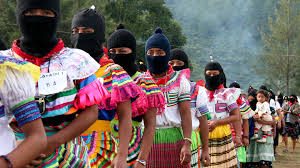Realising a heritage of humanity
by Bager Rosa
Part 1: Experiences and shortcomings of global liberation movements
Resistance against any forms of oppression and exploitation and the search for freedom are social realities which no system of power has ever been able to eradicate. These social resistances and struggles for a life of dignity, freedom and equality reflect fundamental human values, such as conscience and morality, collective culture of remembering, social awareness and the art of political self-organization and leadership. All these struggles form a unity, a virtually unwritten history contrary to the history of centralistic-dominated civilization – a civilization based on state, class domination and the appropriation of social values. For 5,000 years this civilization has been in war with nature, the free natural society and the heritage of a matriarchal culture. This civilization has always been forced to find the means in order to break the spirit of this social heritage of equality and freedom and to forestall the awareness of subjugated societies and their emancipation. In history, we encounter three major lines of social resistance: moral and social resistance in the tradition of struggling communities within (revolting slaves, free cities, rebellious peasants) or outside (indigenous, nomadic) centralized civilization; secondly, spiritual-idealistic and ethical resistance in the tradition of prophets, saints, philosophers, wise women, alchemists and resulting religious movements; thirdly, the tradition of Marxism-Leninism, which transforms the consciousness of social historical resistance into an organized-ideological form and political struggle.
Establishment of the nation state as a new model of domination
After a 300 year display of power, in the 19th century the system of Capitalist Modernity had reached its preliminary peak through Industrialism and Colonialism, subjugating the enslaved societies with extensive slavery, assimilation, and genocide. With the establishment of the nation state as a new model of domination, social consciousness was bound to the new system of domination through the logic of competition, a culture of war and chauvinism on the ideological basis of nationalism and thus diverted from social self-defense, awareness and resistance to exploitation and cultural alienation. Against this project of the centralized power civilization the socialist line of liberation struggle and resistance developed on the basis of the philosophical works of Marx and Engels. With the emergence of socialist movements in all industrialized countries, the idea of Internationalism became a strategic baseline of the liberation struggle. Against the chauvinistic logic of nationalism and hostility between peoples and the cold logic of global capital, the spirit of internationalism became the source of hope and utopias of the oppressed. This fight has been going on since then for 150 years with the proclamation “Proletarians of All Countries, Unite!”
Crisis of the progressive, liberal and socialist forces of Europe
In the 1990s and 2000s, when we began to follow the footsteps of this heritage of revolutionary tradition, Europe’s progressive, liberal and socialist forces were in deep crisis. After the collapse of Real Socialism, the system of Capitalist Modernity, above all a newly united German nation state, proclaimed its victory and the end of history. Against the German society ran a widespread operation to establish a neo-liberal regime of wage labour, bureaucracy and police state. At the same time, this was ideologically masked by fomented nationalism, therefore fascist gangs were on the rise. Thoughts and hopes, dedicated to revolution and socialism, met with massive counter-propaganda and defamation. The old national Liberation Movements of Europe in Ireland (Irish Republican Army) and in the Basque Country (Euskadi Ta Askatasuna) weren’t able to overcome their ideological deficiencies and were isolated from the system. The remnants of the urban Guerillas were forced into the underground or declared their self-dissolution. The heritage of the movements of 1968 had been largely assimilated by the system (such as feminist and ecological movements) or continued its marginalized existence (such as anarchist milieus and sectarian communist groups) in niches and subcultures.
Heritage of revolutionary internationalism as a source of hope and certainty of victory
Without having utopias, resistance and struggle become impossible in the long run. We grew up in a social climate of ideological genocide – a genocide that was directed, above all, against the hope, the belief, and the spiritual-idealistic and moral resistance of society – in short, a genocide against the possibility of another life.
During that time, joining the left-wing scene was often motivated by an attitude of rebelliousness, by emotional rejection of the social conditions and as a rebellion against the unscrupulousness and coldness of the system. Moral self-assertion and the resistance of the conscience naturally led into the ranks of the anti-fascist movement and to rejection of any national chauvinism. Anti-fascist self-defense against fascist gangs was the task.
Despite the perceived immobility, the legacy of revolutionary Internationalism became a source of hope and certainty of victory for us. In a way, this universal line of social resistance was our secret leadership. Against a liberal system, a bureaucratic and police regime which tried to enforce deceptive normality, pacification and a life of alienation, spiritually we joined this internationalist line of struggle and assertion of socialist values. That secret leadership, still unconscious and without a clear expression, finally should lead us into the heart of the revolution in Kurdistan and brought us to the confrontation with the question of real revolutionary guidance.
It is said that we’re able to understand our current situation only with regard to the history and the social struggles of any times. As we commit ourselves to the goal and struggle for a free society and universal human and socialist values, as we oppose a world of subjugation and exploitation, it must be clear to us that we can only be successful if we are linked to the experiences of all the previous revolutionary struggles.
The system of Capitalist Modernity wants to establish its project of subjugation and exploitation on a global level. Therefore also the struggle for another world on the base of a life in freedom, equality and dignity must be fought on a global scale. The tradition of revolutionary Internationalism created a multitude of experience and values which continue their importance today and constitute important lessons for our fight and path. We can take these values of historical resistance with some examples to properly classify their basic understanding:
a) The experience of the International.
In the 19th century, huge worker’s movements emerged in the industrialised countries of Europe and North-America. At the beginning of the 20th century, the contradictions between the imperial powers led to the outbreak of the First World War. This became the opportunity for the system to massacre millions of workers on the battlefields and therefore anticipate a socialist revolution. The reformist social-democratic forces joined the line of war and national chauvinism and so threw themselves into the arms of the imperialist forces.
Against the politics of war and collaboration, Rosa Luxemburg and Karl Liebknecht defended in Germany a radical attitude of international solidarity and the alliance of all workers and oppressed peoples against the capitalist system.
With the victory of the Russian Revolution under the leadership of the Bolsheviks and the organisation of the Communist International (ComIntern), for the first time a leadership organisation emerged which committed itself also to supporting socialist revolutions in other countries.
The paradigm of Marxism-Leninism based on Hegelian philosophy was fouled by the idea of the nation-state in the form of the dictatorship of the proletariat continued its existence in Real Socialism. This idea of a society able to organise itself in the form of a state and thus move towards freedom is until today one of the biggest mistakes of Marxist tradition. The reference to the state as well as Stalin’s principle of „Socialism in one country“ made the ComIntern quickly turn into a tool of power for the industrialised states who used this to enforce their diplomatic-political and military interests. Endless militants and revolutionaries committed to the idea of the International became victims of Stalin’s politics of power, which betrayed internationalist values and handed over hundreds of Communists to Nazi Germany.
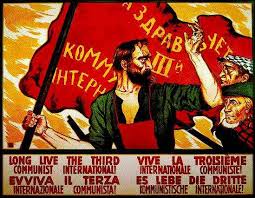
b) The experience of the Spanish Civil War and the Internationalist Brigades.
In 1936, the societies of Spain started broad resistance against the fascist military coup. The workers, peasants and women’s response to the coup attempt was the social revolution based on anarchist self-organisation. A council system and self-defense forces emerged.
To an appeal of the antifascist government of the Socialist Party and the ComIntern, the answer of thousands of Communist and Socialists was to pour into the country to join the International Brigades.
The defeat of the antifascist forces can be exemplified at two points.
First, instead of supporting the revolution as well as broad social mobilisation and organisation of self-defense through the militias, the socialist government insisted on s conservative and centralistic politic which propagated „first the defeat of the fascists, later the social revolution“. In this way, achievements of the revolution were eliminated, brought under government control and thus weakened the spirit of resistance of society.
Second, the attachment of the International Brigades to the socialist government and to the praxis of the ComIntern under the direction of Stalin ensured as a diplomatic weapon that Spain’s fate was sealed at the level of interstate power politics. The two-edged role of the International Brigades and the undermining of the antifascist forces through state power politics both internally and internationally turned Spain into a painful experience and a significant example of international liberation struggle.
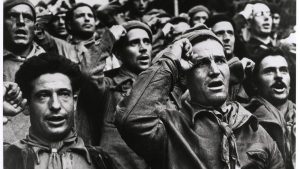
c) National Liberation and the 1968’s revolt.
After the Second World War, in many countries of Latin America, Africa and Asia national liberation movements against colonial occupation emerged. In this phase of international liberation struggle important experiences in both theory and practise could be gained; also important victories were won in liberation wars against imperialist Hegemony and occupying armies.
In the sixties and seventies, an internationalist spirit developed that gave self-confidence and spirit of resistance to societies under occupation and foreign domination. Awareness of the unity of all liberation struggles was also manifested in the alliance of progressive and socialist forces within the metropolis, which in solidarity and mutual support were related to anti-colonial liberation movements and, by supporting the Soviet Union, formed an anti-pole to the hegemony of the leading capitalist states.
Mao’s guerrilla war strategy had brought the Chinese Revolution to victory. The nature of guerrilla warfare as a prolonged people’s war, their own form of organisation and tactics developed into the recipe for success of oppressed societies in the struggle for liberation against technologically superior occupation armies.
In Cuba, the brothers Raúl and Fidél Castro proved that the Guerilla concept is transferable. As the Guerilla gained its strength out of village communes and the communal base of society, also organised itself decentralised and above all, gave form to the desire for freedom and will of society for self-determination, in many countries the occupier armies could not withstand a long time.
In France, broad networks emerged in support of the National Liberation Front (FLN) in Algeria. In connection to the liberation struggle, the work of the psychologist Frantz Fanon was particularly important. His work The Damned of the Earth is a manifesto of anti-colonial liberation. Above all, he devoted himself to investigating the psychological effects of colonial rule and worked towards strategies of liberation. Only by expressing one’s own identity and a collective consciousness of resistance can the psychology of slavery be overcome and liberation consistently achieved.
From the experience of social education work in Brazil, Paolo Freire developed his concept of education as a practice of freedom. In particular, it is important to understand how the struggles and experiences of this time and epoch of the freedom struggle respond to each other, mutually reinforce each other and create an internationalist awareness of the unity of all these struggles.
With the Vietnam War and the 1968’s youth revolt, this epoch of liberation struggle reached its peak. The unity of struggle in the metropolis (in the industrialised countries of Western Europe and North America) and countries under colonial occupation establishes a shared awareness of the possibility of global liberation. The Vietnamese people becoming an army and the development of the Urban Guerilla are important experiences and a deepening of the strategic militancy of the struggle.
The struggles and attempts of 1968 were not only the search for an alternative to the capitalist system of domination, but also tried to find new ways besides the mistakes and defects of Real Socialism and the Soviet Union. From these attempts, only the PKK could assert itself, become a sustainable force and develop its own revolutionary leadership principle.
The military victories of national liberation movements could not prevent the capture and incorporation by the capitalist system. Liberation movements arose in the nation-state model of the Modernity and could not provide a social alternative to the dominant mentality and organisation.
The movements of the metropolis, such as the Black Panther Party, the Red Brigades, and the late generations of the RAF (Red Army Fraction), could be isolated in the absence of retreat areas and were at last undermined by the concerted attacks of secret intelligence counter-insurgency programs.
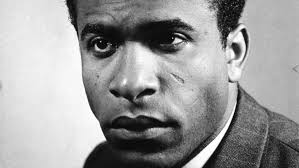
d) The Advance of Neoliberalism and the Anti-Globalisation movement.
In the 1980s, the leading states of Capitalist Modernity began to implement their concept of global neo-liberal rule, which aims to appropriate and integrate all areas of society into the order of finance Capitalism.
As a new global project of control, Green Belt politics and the creation of political Islam were promoted – in the 1980s as a containment of the Soviet Union – frozen in bureaucratism and conservatism-, and after its collapse as a project of global reorganization. With the creation of Gladio, secret NATO counterinsurgency programs were launched, especially in Germany, Italy and Turkey.
In Latin America and elsewhere, counter-revolutions have been carried out through military campaigns, paramilitary warfare and with the help of agents. With few exceptions, such as the liberation movement in Kurdistan and the Colombian guerrillas, revolutionary forces worldwide got into a defensive position. In the metropolis, left-wing forces tried to think of alternatives and to process and overcome mistakes of earlier revolutionary attempts particularly through theoretical work and analysis.
The leading G8 states pushed ahead their project of global hegemony on summits, while a globalisation-critical movement formed with counter-summits (such as the World Social Forum of Porto Alegre) and summit protests.
Despite all attempts, the Anti-Globalisation Movement couldn’t formulate a persistent alternative, couldn’t develop an effective system of self-defense or couldn’t overcome the own protest character.
An important experience is the Peoples’ Global Action network and its model of organisation. A network of national and regional committees has been created on a global level to coordinate and agree on summit mobilisations and perspective discussions. This network brought together diverse movements from indigenous communities, Australian Aborigines and Indian Communists to European anarchists, Russian feminists and Canadian eco-activists. Because of their potential to form a new internationalist force, the movement and leading activists faced a massive assault and torture by police and intelligence agencies at the G8 summit protests in Genoa, Italy, which stifled the movement before it could take a clear form.
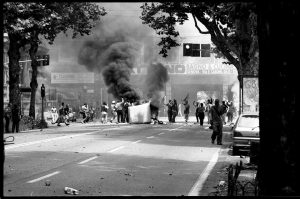
e) The Zapatista uprising and the turning point of the natural society.
As the Zapatista Army of the National Liberation (EZLN) went to uprising at New Year 1994 in southeastern Mexico, it immediately attracted the attention of the world public. The Zapatista uprising began on the same day, when between the US, Canada, and Mexico, the North American Free Trade Agreement (NAFTA) came into effect.
By this means, it got the symbolic power of a struggle for dignity and hope against both a system of total domination and neoliberal slavery and exploitation. The uprising, based on rural indigenous village communities, draws on a deep mythological tradition of natural sociability and 500 years of struggle against colonial subjugation, exploitation and genocide.
It is particularly inspired by the struggle of Emiliano Zapata in the Mexican Revolution of 1910-1920, who represents as a role model and epitomizes the revolutionary leadership of the oppressed.
The Zapatistas draw their strength from the combination of communal values and natural sociality with socialist philosophy, an organised structure of militants, guerrilla struggle and militia system as a self-defense concept.
Against the Mexican neo-liberal and US-compliant government (the “bad government”), the movement has built its own system of democratic autonomy of councils, municipalities, women’s movement, education and health system as “good government“. The 1994 uprising was preceded by ten years of clandestine organization and preparation.
From a thinking based on social reality and mythological traditions, self-governing principles had been developed. There are based on holistic inclusion and change, and expressed as principles such as “questioning progress” (as a method of uniting theory and practice) and „obeying commanding“ (as a principle of leadership and responsibility).
The struggle of the Zapatistas is based both on a deep cultural indigenous heritage and a corresponding identity, as well as on broad national, regional and international alliances against the system of centralized and imperial civilization. „
The Other Campaign“ was launched as a national campaign to democratize Mexico. In particular, it is instructive how the Zapatistas consciously and creatively use media, visibility and clandestinity as a mechanism of self-defense, tool for alliances and inspiration of movements worldwide as a strategic weapon.
Since 2013, the “Little School” project has been used to create internationalist Zapatista academies, while on the Internet, seminars on autonomy and revolutionary experience have been organised for allies.
The Zapatist struggle therefore plays a strategic role for the Latin-American societies. The role and location of Mexico vis-à-vis the United States is comparable to Turkey’s role and position vis-à-vis the EU and its stability. Accordingly vehement, is the attempt of the system to stifle the fight of the Zapatistas by economic projects against the social basis of the movement and warfare of low intensity using Contras. Despite all attempts, the Zapatistas resist and represent today one of the most important and leading projects for building a Democratic Modernity.
